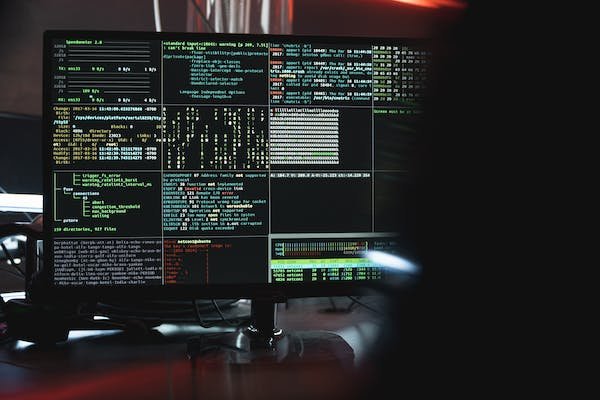Advantages of AI in Cybersecurity
Introduction:
In today’s interconnected world the rise of cyber threats has propelled the need for robust cybersecurity measures. The Advantages of AI in Cybersecurity has ushered in a new era of digital defense. Artificial Intelligence ability to process massive amounts of data and learn from patterns enables it. It is to identify or mitigate and prevent cyber attacks more efficiently. This article delves into the manifold advantages of Artificial Intelligence in cybersecurity elucidating .How this synergy is reshaping the manner we guard our virtual assets.
Advantages AI In CyberSecurity:
Artificial intelligence has the potential to play a crucial role in identifying cyber risks and potential malicious activities. Unlike traditional software systems that struggle to keep up with. The constant infviruses each week Artificial intelligence can provide valuable assistance in this area.
AI systems are undergoing training to detect malware. Perform pattern recognition and identify even the smallest characteristics of malware or ransomware attacks before they infiltrate a system. This is achieved through intricate algorithms. Additionally, with the application of natural language processing Artificial intelligence can enhance predictive intelligence by scanning articles or news and research related to cyber risks autonomously curating relevant material.
TechRepublic reports that on a daily basis medium-sized companies face approximately 200,000 alerts regarding cyber incidents. For an ordinary company their security team would be overwhelmed by. Such a high volume of attacks. Consequently some of these threats could remain undetected. Leading to substantial damage to the network. To effectively operate and safeguard their organizations against cyber threats. Security professionals require substantial assistance from intelligent machines and modern technologies like Artificial intelligence
1. Threat Prevention and Detection:
Cybersecurity systems excel in identifying and anticipating threats. By analyzing historical data and real-time patterns Artificial intelligence algorithms can swiftly pinpoint suspicious activities. That may indicate an impending attack. These advanced systems can even predict potential vulnerabilities. Enabling proactive measures to mitigate risks before they materialize.
2. Rapid Incident Response:
In the realm of cybersecurity, time is of the essence. Artificial intelligence powered tools enhance incident response by automating the detection and classification of threats. This not only accelerates the mitigation process but also minimizes the impact of an attack. Artificial intelligence quick response time aids in isolating affected systems and preventing the spread of malware.
3. Anomaly Detection:
Artificial intelligence excels in identifying anomalies that may go unnoticed by traditional security measures. Machine learning algorithms establish baseline behaviors. Enabling them to detect deviations that could signify a breach. This capability is particularly beneficial for detecting insider threats and zero-day vulnerabilities.
4. Adaptive Learning:
One of Artificial intelligence remarkable strengths is its capacity to learn and adapt. Cyber threats are ever-evolving and Artificial intelligence systems can continuously learn from new data to improve their accuracy in threat detection. As hackers devise new techniques Artificial intelligence algorithms evolve to counter these strategies effectively.
5. Data Protection and Encryption:
Artificial intelligence contributes to enhancing data protection. By imposing sturdy encryption algorithms.This safeguards sensitive information from unauthorized access and ensures that even if a breach occurs. The stolen data remains indecipherable to malicious actors.
6. Authentication and Behavioral Biometrics:
Artificial intelligence driven authentication methods. Such as behavioral biometrics provide heightened security. These structures examine person conduct patterns. Such as typing speed and touch gestures to verify identities. This dynamic authentication approach thwarts unauthorized access attempts effectively.
7. Streamlining Security Operations:
Artificial intelligence automates routine security tasks. Freeing up cybersecurity professionals to focus on strategic planning and high-priority tasks. This streamlining of operations optimizes resource allocation and increases overall efficiency.
8. Predictive Analysis:
Through Artificial intelligence predictive analysis capabilities. Organizations can forecast potential cyber threats and vulnerabilities. This foresight empowers them to take preemptive measures and tailor their cybersecurity strategies accordingly.
9. Leveraging Artificial Intelligence for Threat Hunting:
The integration of Artificial intelligence in cybersecurity extends beyond automated defense mechanisms. Threat hunting, a proactive approach to identifying threats has also evolved with AI. Artificial intelligence driven threat hunting tools can sift through vast volumes of data. Uncovering hidden threats that conventional methods might miss. These tools allow cybersecurity experts to delve into sophisticated attack patterns. Ensuring comprehensive threat mitigation.
10. Addressing Artificial Intelligence Ethical Challenges:
While the advantages of Artificial intelligence in cybersecurity are undeniable. It’s crucial to address ethical concerns surrounding Artificial intelligence technology. As Artificial intelligence becomes more ingrained in cybersecurity, the potential for biases and unintended consequences arises. Ensuring Artificial intelligence algorithms are fair, transparent and free from discrimination is essential to maintain the integrity of digital defense strategies.
Conclusion
In the ever-evolving landscape of cybersecurity Advantages of AI in are indisputable. From fortifying threat detection to enhancing incident response. Artificial intelligence integration empowers organizations to stay one step ahead of cyber adversaries. As technology advances. The collaboration between Artificial intelligence and human expertise will continue to shape a more resilient and secure digital future.















Post Comment